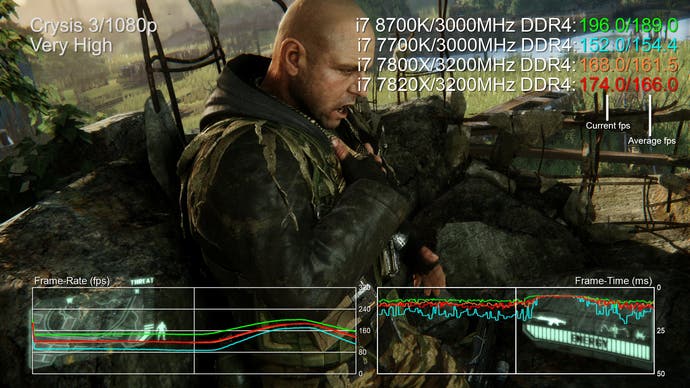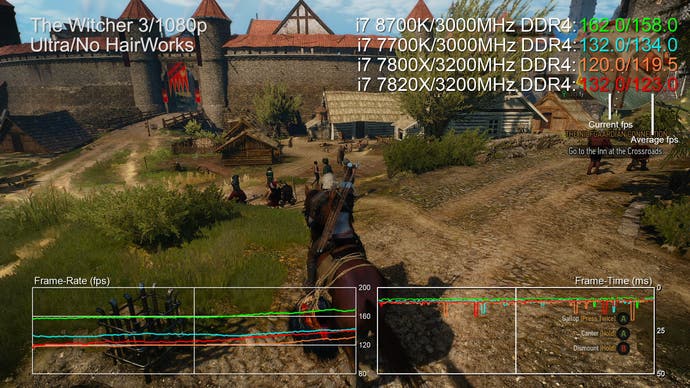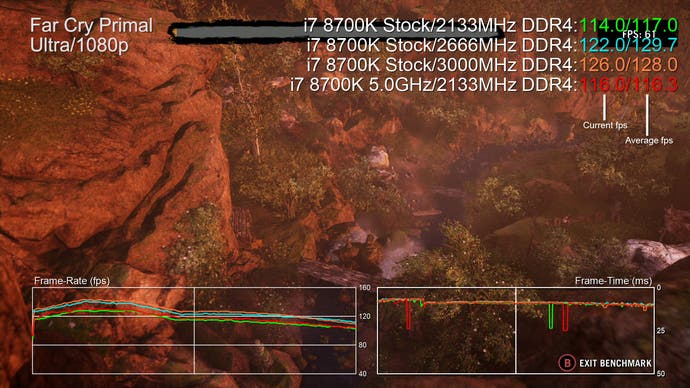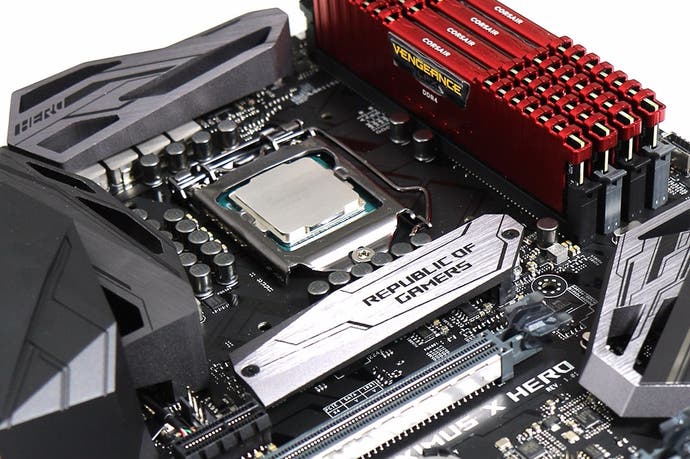Intel Coffee Lake-S: Core i7 8700K review
The fastest gaming CPU money can buy.
The rumours are true. Intel's new Coffee Lake-S represents the biggest generational leap we've seen since the classic Sandy Bridge second-gen Core line, launched way back in 2011. The Core i5 2500K and i7 2600K were the stuff of legend - processors so good, many still use them today, convinced that Intel's iterative approach to CPU upgrades didn't justify replacing a solid platform. Coffee Lake-S has much in common with those classic processors: there's a big gen-on-gen upgrade, an immediately noticeable improvement to performance in all areas and excellent overclocking. The key to Coffee Lake's power is simple: a refined process technology allows for overall faster clocks, while the move from four to six cores in both i5 and i7 offers a massive increase to processing power.
And to be frank, we've been waiting for a many-core processor to arrive that comprehensively trumps the mainstream i7 of the day. Whether we're talking about the current enthusiast-level Skylake-X or indeed Ryzen 7, the six and eight core chips released by Intel and AMD power through productivity and other multi-core heavy tasks, but fall a little short in gaming. What's interesting about Coffee Lake-S is that Intel hasn't repurposed its existing six-core processor - it's brand new. And instead of scaling down a many-core architecture specifically designed for server applications, it's upgraded its existing mainstream platform instead.
As a result, the Core i7 8700K is a winner for several reasons. First of all, it takes the existing Kaby Lake/Skylake architecture and refines it, so the single-thread power that works so well for the mainstream line in gaming is fully retained here. Indeed it's very slightly faster owing to architectural tweaks, meaning that some of the single-core weakness we saw in Skylake-X isn't an issue here. And secondly, that refined process doesn't just allow for improved single-core turbo boost - it also paves the way to the first solid 5.0GHz-stable overclock we've achieved on Intel hardware. And that's all on top of those additional cores, which scale just as they should in heavily threaded workloads and prove far more potent in gaming than the six and eight-core i7 7800X and 7820X.
Here's the breakdown of the current Intel i7 line and how the i7 8700K fits in. There are improved base and boost clocks compared to Skylake-X, along with a much lower TDP and more onboard cache. The enthusiast line's only real advantage is its PCI Express connectivity, along with sheer brute force power on the much more expensive chips. The comparison with the Kaby Lake 7700K sees a lowering of base clock and an increase in TDP. In our tests, the stated 3.7GHz base clock is overly pessimistic - with a decent cooler, the lowest we saw the 8700K deliver was 4.3GHz on all cores.
| Core i7 8700K | Core i7 7700K | Core i7 7800X | Core i7 7820X | Core i7 7900X | |
|---|---|---|---|---|---|
| Cores/Threads | 6/12 | 4/8 | 6/12 | 8/16 | 10/20 |
| Base/Boost Clocks | 3.7GHz/ 4.7GHz | 4.2GHz/ 4.5GHz | 3.5GHz/ 4.0GHz | 3.6GHz/ 4.3GHz | 3.3GHz/ 4.3GHz |
| L3 Cache | 12.00MB | 8.00MB | 8.25MB | 11.00MB | 13.75MB |
| PCI Express Lanes | 16 | 16 | 28 | 28 | 44 |
| Architecture | Coffee Lake | Kaby Lake | Skylake-X | Skylake-X | Skylake-X |
| TDP | 95W | 91W | 140W | 140W | 140W |
In terms of how this all shakes out in terms of hard benchmarks, we've stacked up the i7 8700K against its predecessor, the top-end Ryzen 7 1800X and a range of Skylake-X processors. On top of that, we've also included benchmark data from some overclocked i7s from back in the day. Just about any i7 going back to the 2011 Sandy Bridge should be able to comfortably sustain 4.5GHz, and we've also paired each processor here with the fastest 2400MHz DDR3 we could find. Our intent with this data for legacy processors is to see how overclocking old tech can - or cannot - keep your existing CPU in contention.
There are few surprises from the Cinebench R15 single-core test - the Core i7 8700K and 7700K easily take point, but it's interesting to note that our older overclocked chips still hold up fairly well. Fundamentally, i7s have always been really good buys that have a very long lifespan. Equally unsurprising is the multi-core turnout: the quads are roundly thrashed by the new wave of many-core chips. The 8700K inches ahead of its enthusiast counterpart, the 7800X, but the eight-core Skylake-X and Ryzen 7 are still comfortably ahead.
Beyond the synthetic bench, we also tested video processing with Handbrake for both h.264 and HEVC encoding at 4K using the presets we've chosen for content available on our video download site digitalfoundry.net. Think of this as a real world application for these many-core processors. With h.264 processing, the 8700K is effectively on par with Ryzen, thrashing the 7700K and moving ahead of the 7800X. It's a strong showing that only gets better with overclocking.
HEVC in Handbrake is heavily reliant on AVX instructions - an area where Intel is stronger than AMD. Here, the 8700K storms ahead of Ryzen and isn't a million miles away from the i7 7820X (Handbrake's effectiveness seems to diminish somewhat beyond eight cores). Also unsurprising is that the i7 quads are left for dust. The older i7 3770K is particularly weak here as the old Ivy Bridge architecture lacks AVX instructions. In short, the benchmarks show nothing out of the ordinary really - the numbers suggest that Coffee Lake-S really is a junior enthusiast chip, its stock performance pleasingly beating the 7800X. Gaming, however, is an entirely different story - it's fast. Really fast.
| Core i7 8700K | Core i7 7700K | Core i7 7800X | Core i7 7820X | Core i9 7900X | Core i7 3770K 4.5GHz | Core i7 4790K 4.5GHz | Ryzen 7 1800X | |
|---|---|---|---|---|---|---|---|---|
| Cinebench R15 Single-Core | 191 | 187 | 171 | 177 | 177 | 161 | 177 | 162 |
| Cinebench R15 Multi-Core | 1427 | 963 | 1313 | 1768 | 2203 | 795 | 891 | 1605 |
| Handbrake 0.10.5 x264 | 19.7fps | 13.1fps | 18.3fps | 22.5fps | 25.4fps | 9.8fps | 11.6fps | 19.6fps |
| Handbrake 0.10.5 x265/HEVC | 8.1fps | 6.2fps | 7.9fps | 8.5fps | 10.6fps | 3.7fps | 5.5fps | 6.5fps |
There's a reason that Core i7 has been such a great brand for gaming across the years - and it's borne out by many of the numbers below. Older chips like the i7 3770K and i7 4790K still run modern games beautifully when overclocked and paired with fast memory. We may have moved on from four to six cores, but the i7 6700K and 7700K are still brutally quick, regardless. For the most part, the GPU is still the defining limiting factor in gameplay - but in our tests, we want to see which processors have the most headroom and by extension, which are more futureproof. It's our contention that a good PC platform should last you for four to five years or more, and the better the processor you have, the more headroom you have available.
To get a good idea of relative performance in gaming workloads, our methodology is to run titles at max settings or close to it, running at 1080p resolution and using an overclocked Titan X Pascal to remove that GPU bottleneck as much as we can. Effectively, we're engineering a scenario where we are CPU-bound, and the importance of memory bandwidth also comes to the fore.
Even in this extreme scenario, there are benchmark that show little to no difference across the run of play - Ubisoft's The Division is the most obvious example here, running beautifully across all processors. Assassin's Creed Unity also performs admirably here, regardless of which i7 you may have. Meanwhile, Far Cry Primal represents legacy titles with engines reliant on one or two cores. Again, all i7s hold up nicely, though gaps are starting to appear between the generations, regardless of the older CPUs' overclocks. However, when we move onto the heavily threaded games, magical things happen. The Witcher 3's taxing Novigrad City bench hands in point-blank the fastest gaming experience we've ever seen onthe 8700K, while the jump in Crysis 3 is phenomenal. Ashes of the Singularity's gruelling CPU test also shows the six cores in the 8700K flexing their muscles - the leap is highly impressive.
We've got average frame-rates here across our various runs, but really, we recommend checking out the video review where we talk more about 'in the moment' performance. Intel's own gaming benchmark notes a 25 per cent uplift over the 7700K in Gears of War 4 frame-rates - and we can produce similar results in several titles. However, fundamentally, buying a fast CPU is all about overhead: in Crysis 3 we noted areas where the i7 8700K offers an in the moment performance boost of 50 per cent over its quad-core predecessor. While there's a good argument that the 8700K may be too powerful for most users, games are only going to become more complex in future (especially when consoles move to Ryzen). In the here and now, users of high frequency displays will appreciate the big bump in performance. Key titles like Destiny 2 and Battlefield 1 should play beautifully on this new i7.

| 1080p/Titan X Pascal OC | Core i7 8700K Stock | Core i7 8700K 5.0GHz | Core i7 7700K Stock | Core i7 7700K 4.8GHz | Core i7 3770K 4.5GHz | Core i7 4790K 4.5GHz |
|---|---|---|---|---|---|---|
| Memory | 3000MHz DDR4 | 3000MHz DDR4 | 3000MHz DDR4 | 3000MHz DDR4 | 2400MHz DDR3 | 2400MHz DDR3 |
| Assassin's Creed Unity, Ultra High, FXAA | 134.0 | 135.0 | 132.2 | 132.9 | 123.8 | 129.7 |
| Ashes of the Singularity, DX12, CPU Test | 52.2 | 53.9 | 41.9 | 44.1 | 35.4 | 35.4 |
| Crysis 3, Very High, SMAA T2x | 176.9 | 179.6 | 138.2 | 145.5 | 118.6 | 129.4 |
| The Division, Ultra, SMAA | 138.1 | 138.1 | 133.8 | 133.9 | 129.1 | 132.7 |
| Far Cry Primal, Ultra, SMAA | 137.3 | 138.3 | 137.9 | 140.1 | 111.9 | 121.8 |
| Rise of the Tomb Raider DX12, Very High, SMAA | 140.0 | 143.6 | 126.5 | 131.0 | 96.3 | 106.3 |
| The Witcher 3, Ultra, No Hairworks | 170.1 | 172.3 | 139.4 | 145.2 | 121.2 | 122.1 |
The Core i7 8700K is a curious product, blurring the lines between Intel's mainstream and enthusiast lines. From our perspective, unless you really need those extra PCI Express lanes, the similarly-priced i7 7800X is now surplus to requirements, and you'll need to move onto the 7820X - preferably overclocked - to see a big boost in raw performance. However, based on our tests, Coffee Lake-S really is an astonishingly good gaming processor and it's even better for gaming than the $1000 Core i9 7900X.
Intel migrated to an inter-core 'mesh' for its latest enthusiast-level chips, introducing latency issues that can have a profound impact on gaming. There are similar issues with AMD's Ryzen and Threadripper (represented in the table below by an overclocked eight-core Ryzen 7), which prove to be exceptionally fast at just about everything - except gaming. Our numbers here demonstrate just how far ahead the 8700K can be.
It opens up an interesting question, depending on your work/productivity/gaming requirements from your PC. There's no doubt that the Core i7 7820X and the i9 range can blitz the 8700K when it comes to out and out horsepower. However, nothing touches Coffee Lake-S's gaming performance. And then there's the question of overclocking: we found that with a 1.32v core voltage tweak, the 8700K ran just fine at 5.0GHz - even under testing AVX workloads under Handbrake. Performance in non-gaming tasks is propelled within spitting distance of the stock core i7 7820X - though it must be remembered that Skylake-X processors overclock beautifully too.
Bearing in mind that the surrounding costs of a Z370-based Coffee Lake-S build are significantly lower than the X299 Skylake-X, there's a really compelling argument that many users who may have considered an enthusiast build may be better served by going for the 8700K instead.

| 1080p/Titan X OC | Core i7 8700K | Core i7 7800X | Core i7 7820X | Core i9 7900X | Ryzen 7 1700 4.0GHz |
|---|---|---|---|---|---|
| Memory | 3000MHz DDR4 | 3200MHz DDR4 | 3200MHz DDR4 | 3200MHz DDR4 | 3200MHz DDR4 |
| Assassin's Creed Unity, Ultra High | 135.0 | 127.5 | 125.5 | 128.1 | 120.8 |
| Crysis 3, Very High | 176.9 | 149.1 | 154.8 | 165.4 | 143.8 |
| The Division, Ultra | 138.1 | 135.9 | 137.2 | 136.2 | 128.4 |
| Far Cry Primal, Ultra | 137.3 | 110.2 | 106.3 | 109.0 | 97.2 |
| The Witcher 3, Ultra, No Hairworks | 170.0 | 131.8 | 142.0 | 147.7 | 121.3 |
Finally, we wanted to discuss memory bandwidth and what system RAM you should pair with a new Coffee Lake-S system. For the six-core i5s and i7s, Intel has increased bandwidth compatibility to 2666MHz DDR4, a match for Ryzen. We're still of the belief that AMD has the right idea in opening up DDR4 overclocking to a wider range of boards (this remains unlocked on the Z-boards with Intel, the same as always) but the good news is that with the Core i7 8700K at least, 2666MHz RAM offers fairly close performance in many games when compared against our standard Corsair Vengeance LPX 3000MHz sticks. Memory bandwidth monsters like The Witcher 3 still see a boost when faster memory is in play, but in many of our other tests, the dent in frame-rates by running at the rated 2666MHz isn't so pronounced.
This is especially good news for the locked processors like the non-K Core i7 8700 down to the 'entry level' six-core i4 8400, all of which will run with 2666MHz memory (unfortunately, all the eighth-gen i3 quad-core chips are limited to DDR4-2400). The benchmarks here demonstrate that memory bandwidth is still important when it comes to processor overclocking though - you can waste a lot of time and energy overclocking your i7 8700K to 5.0GHz, but if you're using bargain basement 2133MHz DDR4, it'll still run games slower than a stock chip paired with faster modules.

| 1080p/Titan X OC | Core i7 8700K | Core i7 8700K | Core i7 8700K | Core i7 8700K 5.0GHz | Core i7 8700K 5.0GHz | Core i7 8700K 5.0GHz |
|---|---|---|---|---|---|---|
| Memory | 2133MHz DDR4 | 2666MHz DDR4 | 3000MHz DDR4 | 2133MHz DDR4 | 2666MHz DDR4 | 3000MHz DDR4 |
| Far Cry Primal, Ultra | 133.1 | 140.0 | 141.0 | 136.1 | 141.7 | 143.6 |
| Rise of the Tomb Raider DX12, Very High | 133.2 | 139.2 | 140.0 | 135.5 | 138.9 | 141.2 |
| The Witcher 3, Ultra, No Hairworks | 142.8 | 162.0 | 170.0 | 144.7 | 164.0 | 172.3 |
Intel Coffee Lake-S: Core i7 8700K - the Digital Foundry verdict
The move from four to six cores has delivered the biggest generational leap in mainstream gaming CPU power we've seen from Intel for many years, making the Core i7 8700K a simply terrific processor. It's especially impressive bearing in mind just how potent its predecessor was - and still is. Out-of-the-box performance is massively improved, non-gaming tasks see some surprisingly positive results up against the enthusiast chips, while Intel's continuing refinements to its 14nm fabrication process have resulted in even better overclocking results, even though the Coffee Lake processor itself is obviously larger and more complex than the outgoing Kaby Lake.
Every time a new mainstream i7 arrives, it becomes the default best-buy for extreme gaming but there's a genuine level of excitement here with Coffee Lake-S - you're getting many of the advantages of the enthusiast line without the impact on gaming performance. As the benchmark results rolled in, there was almost a sense of disbelief in how fast some of the boosts were - the 8700K retains everything that was impressive about the 6700K and 7700K, amplifying their best qualities with the brace of extra cores.
But it's not all good news. The Z370 chipset offers the same physical socket and a very similar feature set to the older Z270 offering, but the increased power demands on Coffee Lake-S ensure that your older motherboard can't run the new line of processors. Bearing in mind the big boost in performance, moving from Skylake or Kaby Lake to the new i7 is far more attractive than prior gen-to-gen upgrades, but the cost of a new motherboard adds significantly to the expense. Additionally, the i5 and i7 K chips are also pricier than their predecessors - UK pricing is uncertain right now, but we're looking at an additional $50 USD for the i7. For this much extra power though, we'll take it.
In the here and now though, it's been a remarkable year for PC CPU technology. AMD's return with Ryzen has shaken things up, but the lacklustre incremental improvements found in the i7 7700K have effectively forced Intel to be more bold - to go wider with more cores, more threads and more performance. Put simply, the Core i7 8700K is an excellent flagship product, and we look forward to testing the cheaper six-core i5 alternatives.


